Sanatan Articles
Satyaagrah
Written on
Satyaagrah
Written on
Satyaagrah
Written on
Satyaagrah
Written on
Satyaagrah
Written on
JOIN SATYAAGRAH SOCIAL MEDIA
Haunting history- 50 years of Operation Searchlight in Dhaka

The world history recorded March 25, 1971 black night as a rare case when the military of a country launched a sudden brutal assault on sleeping civilian population of the same country the way Pakistani army did under the infamous Operation Searchlight, as they called it.
Awami League under the leadership of Sheikh Mujibur Rahman secured a majority in Pakistan’s General Election of 1970. He should have become the Prime Minister of Pakistan. But Pakistan refused to hand over power to the Awami League. In January, 1971, President General Yahya Khan, PPP leader Zulfiqar Ali Bhutto & the military brass met in Larkana and decided in favour of military action. Pakistanis gave a name to their vicious plan- ‘Operation Searchlight’.
On February 22, 1971, the military generals in West Pakistan, who hitherto enjoyed the throne, took a decision to crush the Awami League and its supporters. It was recognised from the outset that a genocidal campaign would be necessary to eradicate the threat of Bengalis demanding basic democratic and human rights: "Kill three million of them," said President Yahya Khan at a February conference, "and the rest will eat out of our hands."
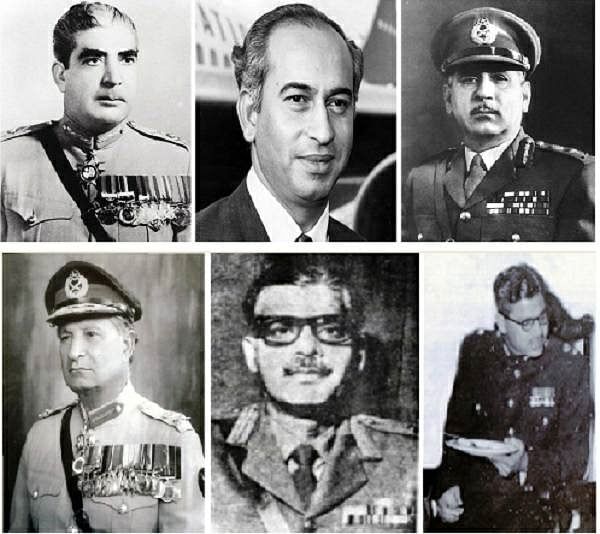 Masterminds of Operation Searchlight- (clockwise from top left) Pakistan President Gen Yahiya Khan, PPP’s leader Zulfiqar Ali Bhutto, Gen Tikka Khan, Gen Khadim Hussein Raja, Gen. Rao Farman Ali and Gen AAK Niazi |
General Tikka Khan, infamous as the ‘butcher of Baluchistan’, was appointed the chief of East Pakistan Military Command. Maj. Gen. Khadim states in his book that Tikka Khan’s appointment indicated that the regime was replacing the ‘doves’ with the ‘hawks’ in E. Pakistan. Tikka Khan knew how to crush an uprising with his past experience in Baluchistan. He reportedly said, ‘I don’t need people, just the soil’. Major Gen. Rao Farman Ali, who served under General Tikka Khan, wrote in his diary- ‘The green soil of East Pakistan would be turned red’.
In his diary, Gen. Farman listed the names of Bengali intellectuals killed. After the liberation of Bangladesh, few pages of this diary were salvaged from the Governor House in Dhaka.
According to Maj. Gen. Khadim, verbal orders were given/conveyed to all West Pakistani officers in command of troops in E. Pakistan. No written orders were issued. As per Maj. Gen. Khadim, main elements of the plan were as follows:
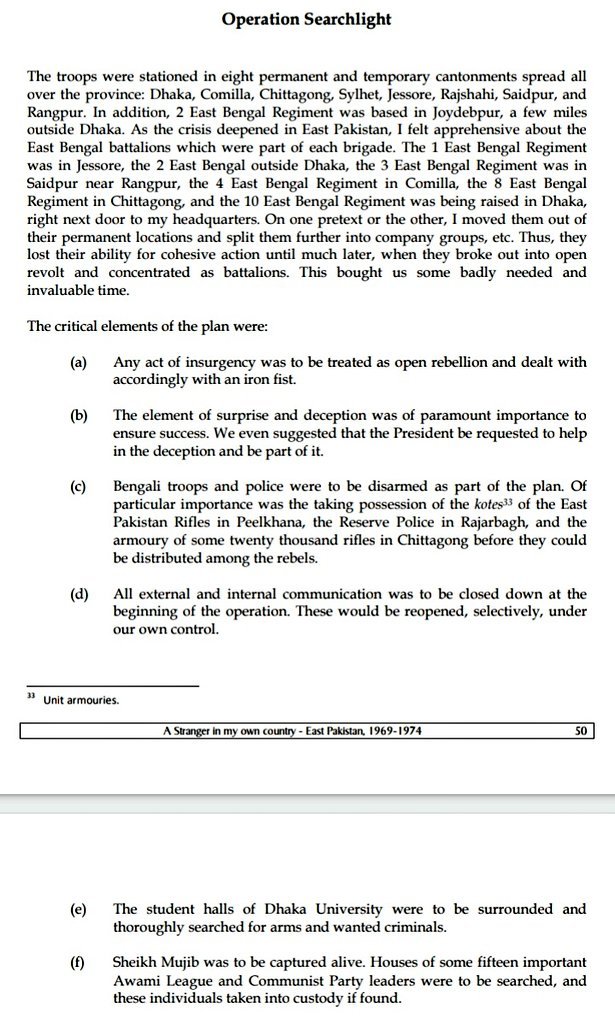 Operation Searchlight Order |
The mobilization of the army continued unabated from February onward. A meeting between Mujib-Bhutto-Yahya in March, 1971 was a diversionary tactics as soldiers and arms were flown and shipped to East Pakistan. Soldiers of 22 Baluch Regiment & 13 Frontier Force Regiment were flown into Dhaka in civilian dress by Pakistan International Airlines (PIA).
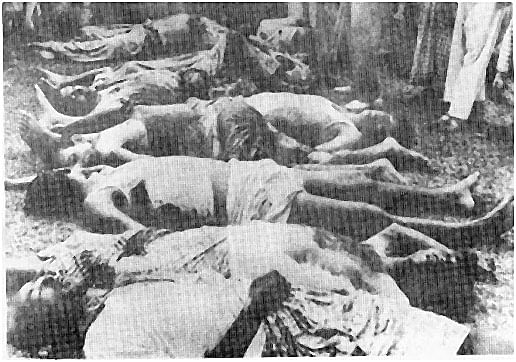 A picture depicts the genocide of the Bengalis |
PIA’s Bengali crew and officials noticed this and refused to service those fights. Two of them planned to blow up a plane carrying troops in civilian dress but were nabbed by Pakistan’s intelligence agencies. Thereafter Pakistan Air-force took over control of PIA flights. Light arms were carried by the troops coming by air while heavy arms & artillery were brought in by ships. MV SWAT arrived at Chittagong port with seven thousand tons of ammunition. Tanks were also brought into Dhaka for the operation from Rangpur. East Pakistan Rifles (EPR) and police were kept out of the exercise.
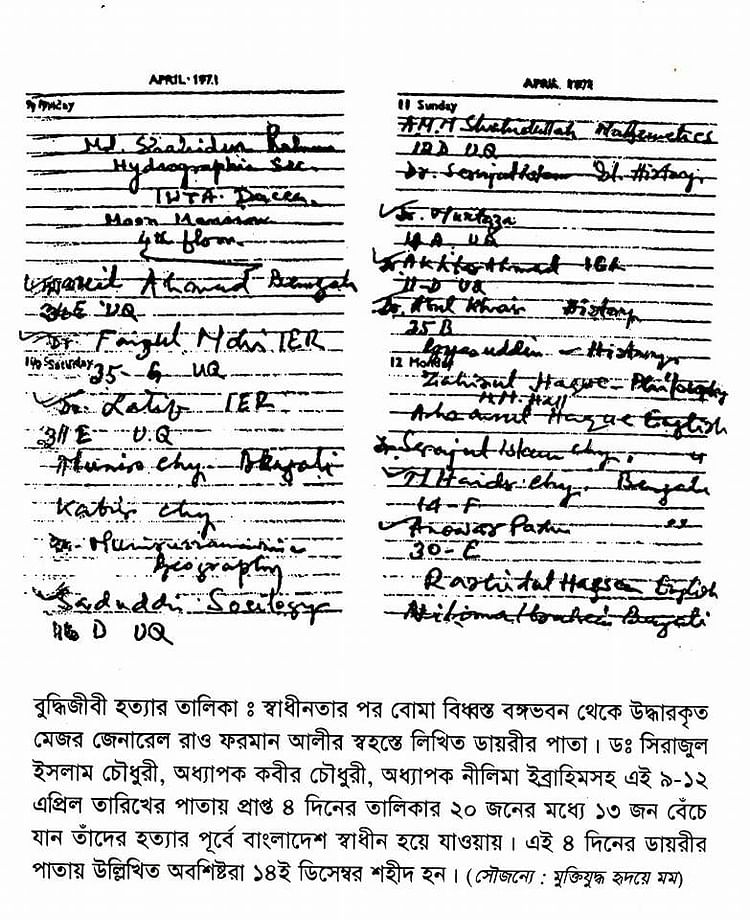 Rao Farman Ali's diary |
Instead, the army planned to first attack EPR headquarters at Pilkhana and Police headquarters at Rajarbagh and snuff out any possibility of resistance by killing Bengali soldiers in cantonments of East Pakistan and other Bengali armed personnel.
By March 23, 1971 i.e. Pakistan Day, the situation was such that the Pakistani flag could hardly be seen flying anywhere in Dhaka except in the localities inhabited by Urdu speaking Biharis. This news report by CBS News reveals the situation:
On 25 March, 1971, Yahya khan left Dhaka after it was decided to begin the crackdown at 6 pm. By 10.30 pm, the troops took over the TV and radio stations in Dhaka. An hour later, the indiscriminate killing of Bengalis commenced. EPR headquarter, Police Headquarter, University of Dhaka, EBRC of Chittagong came under attack. In the second phase, Pakistan army began to kill civilians.
On the fateful night of March 25, 1971, the Pakistani army officially launched its campaign of genocide in erstwhile East Pakistan, by unleashing death squads that mercilessly killed 7,000 unarmed, innocent Bengalis in one single night.
The immediate aim of Operation Searchlight was to crush Awami League’s non-cooperation/civil disobedience movement and to restore the writ of the martial law authorities in East Pakistan. One of the very first steps taken in this regard was the arrest of Sheikh Mujib ur Rehman. Soon after, raids were also made to arrest other prominent AL leaders. All of them, except Dr. Kamal Hossain (ex Vice Chairman of Pakistan Bar Council), managed to escape before they could be arrested. These leaders later formed the nucleus of the Bangladesh government-in-exile. Major targets included the Dhaka University, which was the hub of pro AL/pro independence political activity. The army claimed that students there had armed themselves & it retaliated when it was attacked. However subsequent evidence revealed otherwise.
The prime targets of Operation Searchlight were the Dhaka University teachers and students, the lifeblood of the resistance movement, who were exterminated in their hundreds. The Pakistani army sought out those especially likely to join the resistance—young boys. In the next morning, bodies of young men would be found in fields, floating down rivers, or near army camps.
Anthony Mascarenhas, a British journalist based in Pakistan, who was the first to break the news of the Bengali genocide in international media, reported a Pakistani army major telling him: "This is a war between the pure and the impure... The people here may have Muslim names and call themselves Muslims. But they are Hindu at heart. We are now sorting them out... Those who are left will be real Muslims. We will even teach them Urdu."
Any one who was in support of the liberation Any one who was in support of the liberation movement and was against Pakistani attack was labeled as “Hindu”, “Mukti” or “Joy Bangla” or “Awami Leaguer”. They were also termed as “Gaddar” or betrayer and was executed mercilessly.
The indiscriminate killing continued rest of 9 month. The army searched for every civilian who supported the freedom fighters and either executed them, or captured and tortured them inhumanely.
Meherunnesa Chowdhury, who was a Senior House Tutor of Rokeya Hall, described how female student halls were raided by army men, who, before brush-firing hundreds of students to death in their own dorms, would look for girls they thought were "pretty" and would capture and drag them to their army trucks, never to be seen again. Male students were lined outside their dorms and shot execution-style in batches, while others were made to dig mass graves and bury their newly deceased friends. After their job was done, they, too, were shot to death and buried on top of their friends.
Other mass graves were dug by the army where people, dead or alive, were hastily buried and later bulldozed. Anwar Pasha, in his docu-novel, Rifle, Roti, Aurat, describes the sight of the fingers of some just-buried people sticking out from under the ground like baby plants, which fought for life, but could not quite make it. The Pakistani soldiers knew all the "noble" arts of warfare. First, they set fire to the houses of slum dwellers, and then when they came out, half-burnt, running on the streets in panic, the army mowed them down with bullets "for violating the curfew order".
Survivors described how human corpses lay as far as the eye could see, charred and roasted on the streets, the sidewalks and the portico of homes. Pasha describes the body of a son and a father on the roof of a building, the sight of which was particularly unsettling. The father had tried to protect his son, dearer than his own life, by spreading his own body over his, like a veritable shield. Alas, despite the father's best efforts, the machine gun's bullets had pierced through both of them as they lay in that position.
Children described how they, while hiding underneath the bed to escape detection from the army, had to witness their parents being shot to death, as their lifeless bodies crashed against the bedroom floor, creating a pool of blood which soon seeped into their own hands and faces. Their heart signalled them to scream their lungs out, but their brains instructed them to keep silent, unless they, too, wanted to be shot and killed. A father described how his 14-day-old baby daughter was thrown outside the window by the army, in front of his very eyes. When he screamed in protest, he too was shot and lost consciousness ("Operation Searchlight", Boishakhi TV documentary).
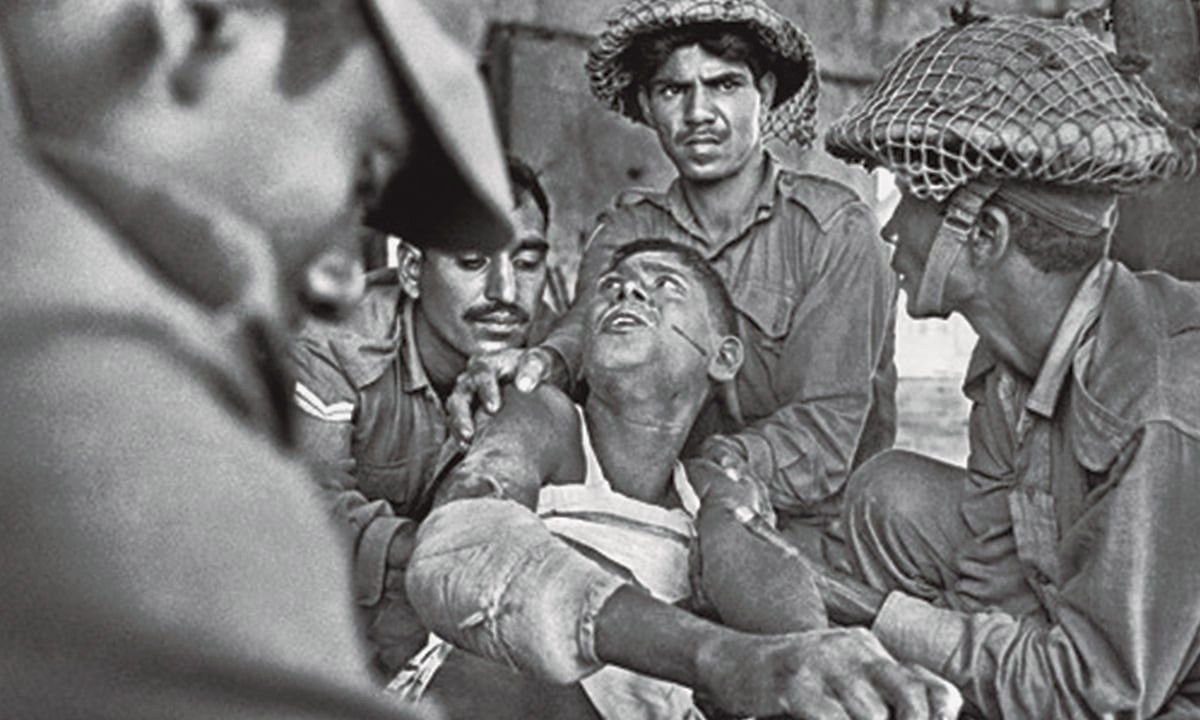 |
Zakaria Masud described how his father, Professor Moniruzzaman, head of the Department of Statistics at the University of Dhaka, and elder brother were similarly killed. The army banged against their door at the dead of night, but since no response came from the other side, they broke it open with heavy boots and searched for the professor. Upon finding the professor, they dragged him and his son by the stairs and after reaching the driveway, they asked him to sit down on the floor. He refused. So they shot his left calf, and blood began to spill seamlessly. The army asked him to sit again, but the professor remained steadfast in his denial and so they finally shot him in the forehead and he fell to the floor, never to rise again.
Professor Meghna Guhathakurta describes how her father, Jyotirmoy Guhathakurta, an English teacher at Dhaka University, was picked up from their house by the army, and how her mother had innocently handed her husband an extra pair of clothes, should he need to spend the night outside. Moments later, they heard rounds of gunfire upon which they stormed out of their door to find the freshly shot bodies of their beloved neighbours, Professor Moniruzzaman and his son, gasping for life.
On the same night, the offices of leading national newspapers like the Daily Ittefaq, the Daily Sangbad and the People were set on fire for reporting the truth and supporting the Bengali movement, killing a large number of top journalists and media personnel, who were burnt to death inside these offices. Soldiers razed the Kali Mandir, a Hindu temple, to the ground and blew up the Central Shaheed Minar in a similar fashion. On the streets, common citizens were murdered at random. Rickshaw pullers were shot to death in their sleep as they lay on their three-wheelers.
On the eve of this genocidal campaign, then-president Yahya Khan left Dhaka for Karachi, but Zulfiqar Ali Bhutto, then president of the Pakistan People's Party, casually observed the operation from the balcony of his luxurious presidential suite at the Hotel Intercontinental, Dhaka. He saw Dhaka burning in front of his very eyes, heard the helpless cries of innocent civilians, the crackle of burning material, the roar of tanks, the boom of guns and the rattle of machine guns. Yet the very next day, Bhutto, on the eve of his departure, highly appreciated the action of the army and commented: "Thanks to God that Pakistan could have been saved."
Sadly, in spite of the overwhelming evidence, footage of the killings, the mass graves, innumerable eyewitness accounts and the factual coverage by foreign journalists during 1971, the Bangladeshi genocide has still not been recognised as such by the United Nations. Even more repulsively, the Pakistani government, far from issuing an official apology, continues to deny that such atrocities even occurred, going as far as showing solidarity for the war criminals of 1971 and shielding them from prosecution.
It is deeply regrettable that while some Pakistani citizens and academics have acknowledged and condemned this genocide, the Pakistani government has shamelessly chosen to remain in denial. This is precisely why the truth of the Black Night of March 25, 1971 must be brought to light, so everyone, both in and outside Pakistan, finally gets to know about the world's most forgotten genocide and Bangladeshis, finally get to see Pakistan's own version of Nuremberg Trials take place.
References:
thedailystar.net - Taqbir Huda
nationalheraldindia.com - Shalini Sahay
nayadaur.tv - Naya Daur Media
en.banglapedia.org
Aalgaard, Wendy; East Indians in America, p30
Bose, Sarmila; Anatomy of Violence: Analysis of Civil War in East Pakistan in 1971: Military Action: Operation Searchlight
Helal, Al; Bhasha Andoloner Itihas (History of the Language Movement) (2003)
Islam, Major Rafiqul; A Tale of Millions, p 57
Mascarenhas, Anthony; The Rape of Bangla Desh, , pp. 116-17
Payne, Robert; Massacre, p. 48
Salik Siddiq Witness To Surrender p63 p228 Salik, Siddiq, Witness To Surrender, p63, p228-229 231 229, 231
Sarkar, Sourindranath; Student unrest: a socio-psychological study: p3
Sharma, Anand; History of Youth Movement in India, Other resources
"UF elections victory" (PHP). Chronicles of Pakistan
 Support Us
Support Us
Satyagraha was born from the heart of our land, with an undying aim to unveil the true essence of Bharat. It seeks to illuminate the hidden tales of our valiant freedom fighters and the rich chronicles that haven't yet sung their complete melody in the mainstream.
While platforms like NDTV and 'The Wire' effortlessly garner funds under the banner of safeguarding democracy, we at Satyagraha walk a different path. Our strength and resonance come from you. In this journey to weave a stronger Bharat, every little contribution amplifies our voice. Let's come together, contribute as you can, and champion the true spirit of our nation.
 |  |  |
| ICICI Bank of Satyaagrah | Razorpay Bank of Satyaagrah | PayPal Bank of Satyaagrah - For International Payments |
If all above doesn't work, then try the LINK below:
Please share the article on other platforms
DISCLAIMER: The author is solely responsible for the views expressed in this article. The author carries the responsibility for citing and/or licensing of images utilized within the text. The website also frequently uses non-commercial images for representational purposes only in line with the article. We are not responsible for the authenticity of such images. If some images have a copyright issue, we request the person/entity to contact us at This email address is being protected from spambots. You need JavaScript enabled to view it. and we will take the necessary actions to resolve the issue.
Related Articles
- Violence Against Minority Hindus in Bangladesh: The Mistier World Of Silence
- Why Hindu-Sikh genocide of Mirpur in 1947 ignored? Why inhuman crimes of Radical Islamists always hidden in India?
- Prophecies of Jogendra Nath Mandal getting real after seventy years of his return from Pakistan
- Moplah Genocide of the Malabar Hindus, 1921: Thousands of Hindus slaughtered
- The Islamic Doctrine of Permanent War: Jihãd and Religious Riot
- On 16th Aug 1946, during Ramzan's 18th day, Direct Action Day aimed to provoke Muslims by mirroring Prophet Muhammad's victory at Badr, Gopal 'Patha', the Lion of Bengal, heroically saved Bengali Hindus & Calcutta from a planned genocide, altering history
- Speech of Sardar Patel at Calcutta Maidan in 1948 busts the myth of ‘Muslims chose India’ and is relevant even today
- Supreme Court dismisses plea seeking protection of Hindus from the Muslim community in Mewat
- Godse's speech and analysis of fanaticism of Gandhi: Hindus should never be angry against Muslims
- ‘Go to haram restaurants and poison their food’: Ex-Australian ISIS bride now lives a free life in Turkey. Details
- Hindus documented massacres for 1000s of years: Incomplete but indicative History of Attacks on India from 636 AD
- Dhimmitude is nothing but a Stockholm Syndrome
- Dangers of losing our identity: Guru Tegh Bahadur forgotten and Aurangzeb being glorified
- Wikipedia dismisses Love Jihad as a conspiracy theory by Hindus, but claims reverse Love Jihad against Muslims is real
- Twitter rewards an Islamist org, set to be banned by India, with a verified blue tick: Here is what PFI has done in the past





















